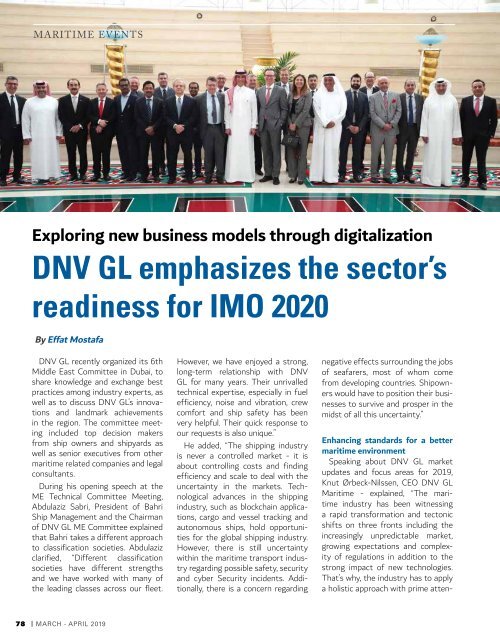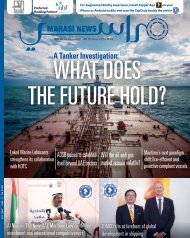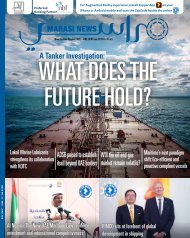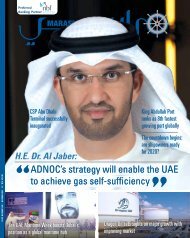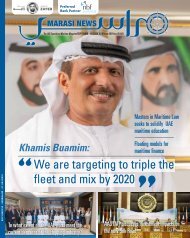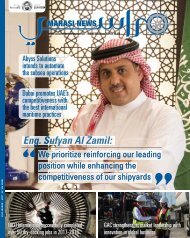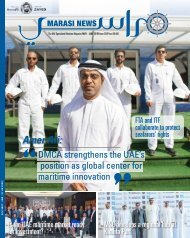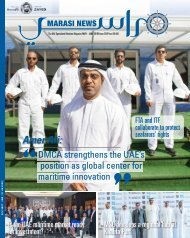marasi33-For final web
You also want an ePaper? Increase the reach of your titles
YUMPU automatically turns print PDFs into web optimized ePapers that Google loves.
MARITIME EVENTS<br />
<strong>For</strong> Augmented Reality experience, install Zappar App on your<br />
iPhone or Android mobile and scan the ZapCode beside the article<br />
Exploring new business models through digitalization<br />
DNV GL emphasizes the sector’s<br />
readiness for IMO 2020<br />
By Effat Mostafa<br />
DNV GL recently organized its 6th<br />
Middle East Committee in Dubai, to<br />
share knowledge and exchange best<br />
practices among industry experts, as<br />
well as to discuss DNV GL’s innovations<br />
and landmark achievements<br />
in the region. The committee meeting<br />
included top decision makers<br />
from ship owners and shipyards as<br />
well as senior executives from other<br />
maritime related companies and legal<br />
consultants.<br />
During his opening speech at the<br />
ME Technical Committee Meeting,<br />
Abdulaziz Sabri, President of Bahri<br />
Ship Management and the Chairman<br />
of DNV GL ME Committee explained<br />
that Bahri takes a different approach<br />
to classification societies. Abdulaziz<br />
clarified, “Different classification<br />
societies have different strengths<br />
and we have worked with many of<br />
the leading classes across our fleet.<br />
However, we have enjoyed a strong,<br />
long-term relationship with DNV<br />
GL for many years. Their unrivalled<br />
technical expertise, especially in fuel<br />
efficiency, noise and vibration, crew<br />
comfort and ship safety has been<br />
very helpful. Their quick response to<br />
our requests is also unique.”<br />
He added, “The shipping industry<br />
is never a controlled market - it is<br />
about controlling costs and finding<br />
efficiency and scale to deal with the<br />
uncertainty in the markets. Technological<br />
advances in the shipping<br />
industry, such as blockchain applications,<br />
cargo and vessel tracking and<br />
autonomous ships, hold opportunities<br />
for the global shipping industry.<br />
However, there is still uncertainty<br />
within the maritime transport industry<br />
regarding possible safety, security<br />
and cyber Security incidents. Additionally,<br />
there is a concern regarding<br />
negative effects surrounding the jobs<br />
of seafarers, most of whom come<br />
from developing countries. Shipowners<br />
would have to position their businesses<br />
to survive and prosper in the<br />
midst of all this uncertainty.”<br />
Enhancing standards for a better<br />
maritime environment<br />
Speaking about DNV GL market<br />
updates and focus areas for 2019,<br />
Knut Ørbeck-Nilssen, CEO DNV GL<br />
Maritime - explained, “The maritime<br />
industry has been witnessing<br />
a rapid transformation and tectonic<br />
shifts on three fronts including the<br />
increasingly unpredictable market,<br />
growing expectations and complexity<br />
of regulations in addition to the<br />
strong impact of new technologies.<br />
That’s why, the industry has to apply<br />
a holistic approach with prime attention<br />
to safety when adapting to new<br />
demands and opportunities.”<br />
Nilssen clarified, “We have developed<br />
advanced tools such as Ship Implementation<br />
Plan and Fuel Change<br />
Over Calculator that help ship owners<br />
choose the system most suitable<br />
for their ship and, most importantly,<br />
supports them in avoiding costly<br />
systems which are not compliant.<br />
We use these tools to perform quick<br />
assessments of treatment technologies<br />
for specific vessels on behalf of<br />
our customers.”<br />
Digitalization to increase efficiency<br />
and safety<br />
DNV GL also announced that that<br />
all DNV GL classed vessels are now<br />
able to utilize the possibility of remote<br />
surveys for some inspections<br />
through the Veracity data platform.<br />
“This is another big step forward<br />
in using the power of digitalization<br />
and increased connectivity to deliver<br />
smarter and more efficient services,”<br />
said Nilssen.<br />
He added, “Remote surveys allow<br />
us to free up time for our customers,<br />
while delivering our services with unparalleled<br />
response time. In addition,<br />
cutting down on unnecessary travel<br />
can result in lower costs, less waiting,<br />
and operational up-time. We’ve had a<br />
great response from our customers<br />
and support from major flag states,<br />
and we are deeply appreciative of the<br />
feedback provided to us to make this<br />
project a great success.”<br />
More than 1,000 remote surveys<br />
were completed in the pilot and scaling<br />
up phase by the Direct Access<br />
to Technical Experts (DATE) units<br />
based in the Maritime Operational<br />
Knut Ørbeck-Nilssen<br />
CEO DNV GL Maritime<br />
Centre in Høvik, alongside units in<br />
Hamburg, Singapore, Houston and<br />
Piraeus. Technology testing began in<br />
2017, with the first production pilots<br />
in June 2018, and now the entire<br />
DNV GL fleet is able to take advantage<br />
of the service.<br />
Exchange Views<br />
Committee members also shared<br />
market developments and potential<br />
opportunities within the industry.<br />
Speaking about Bahri’s journey<br />
for Cyber Security, Anup Kumar<br />
Sah, Bahri’s HSSEQ Asst. Manager<br />
pointed out, “New risks continue to<br />
emerge alongside advancements in<br />
technologies, posing problems to<br />
their critical infrastructure. Similarly,<br />
maritime security has become<br />
a key focus area for the countries as<br />
they are keenly pursuing their economic<br />
diversification goals through<br />
increased trade with regional and<br />
DNV GL HAD A GREAT RESPONSE FROM<br />
CUSTOMERS AND SUPPORT FROM MAJOR FLAG<br />
STATES"<br />
international economies. That’s why,<br />
we at Bahri have implemented a rigid<br />
Cyber Security policy and solutions<br />
to better protect our resources and<br />
data.”<br />
Tackling the fuel challenge 2020<br />
and its impact on shipowners, Pawan<br />
Sahni, DNV GL Business Development<br />
Manager for Middle East highlighted,<br />
“From 2020 and onwards, we<br />
are no longer able to use traditional<br />
heavy fuel oils (HFO), with 3.5%<br />
Sulphur content, unless you're using<br />
a scrubber. We are going to see is a<br />
new range of compliant fuels along<br />
with the current low Sulphur distillate<br />
fuels. With the current bunker<br />
prices, there is a spread of around<br />
about US$175. This figure is important<br />
because this is the figure that<br />
everybody uses when they talk about<br />
the return on investments for scrubbers.”<br />
He added, “It is hard to predict exactly<br />
what these pressures will mean<br />
for the price of marine fuels and diesel<br />
cost to other sectors, or indeed<br />
the cost of marine transport, but<br />
we do not think the world economy<br />
is aware of the increase in the cost<br />
coming its way. The shipping industry<br />
isn’t getting this message across.”.<br />
78 MARCH - APRIL 2019<br />
MARASINEWS.COM 79


